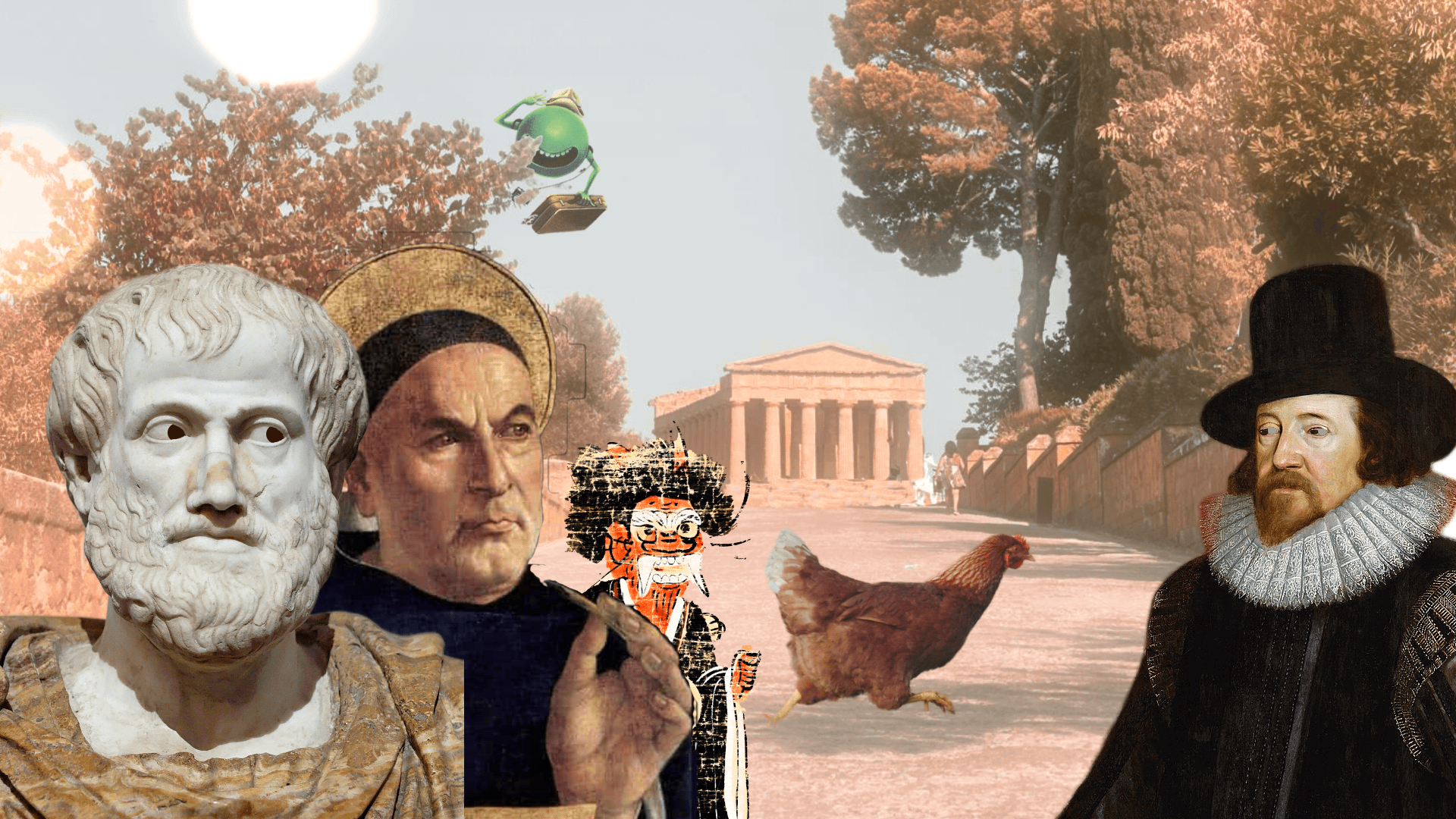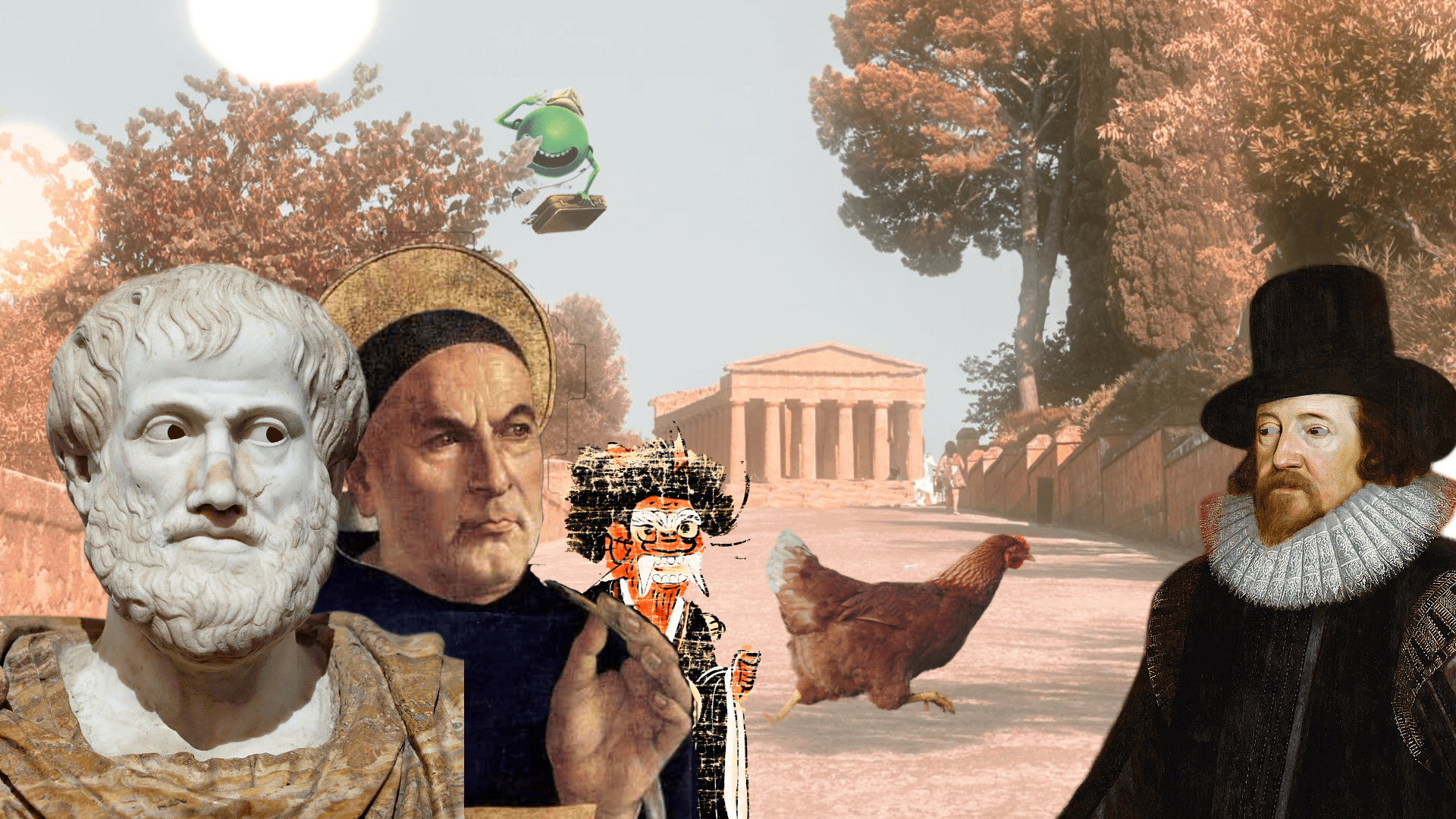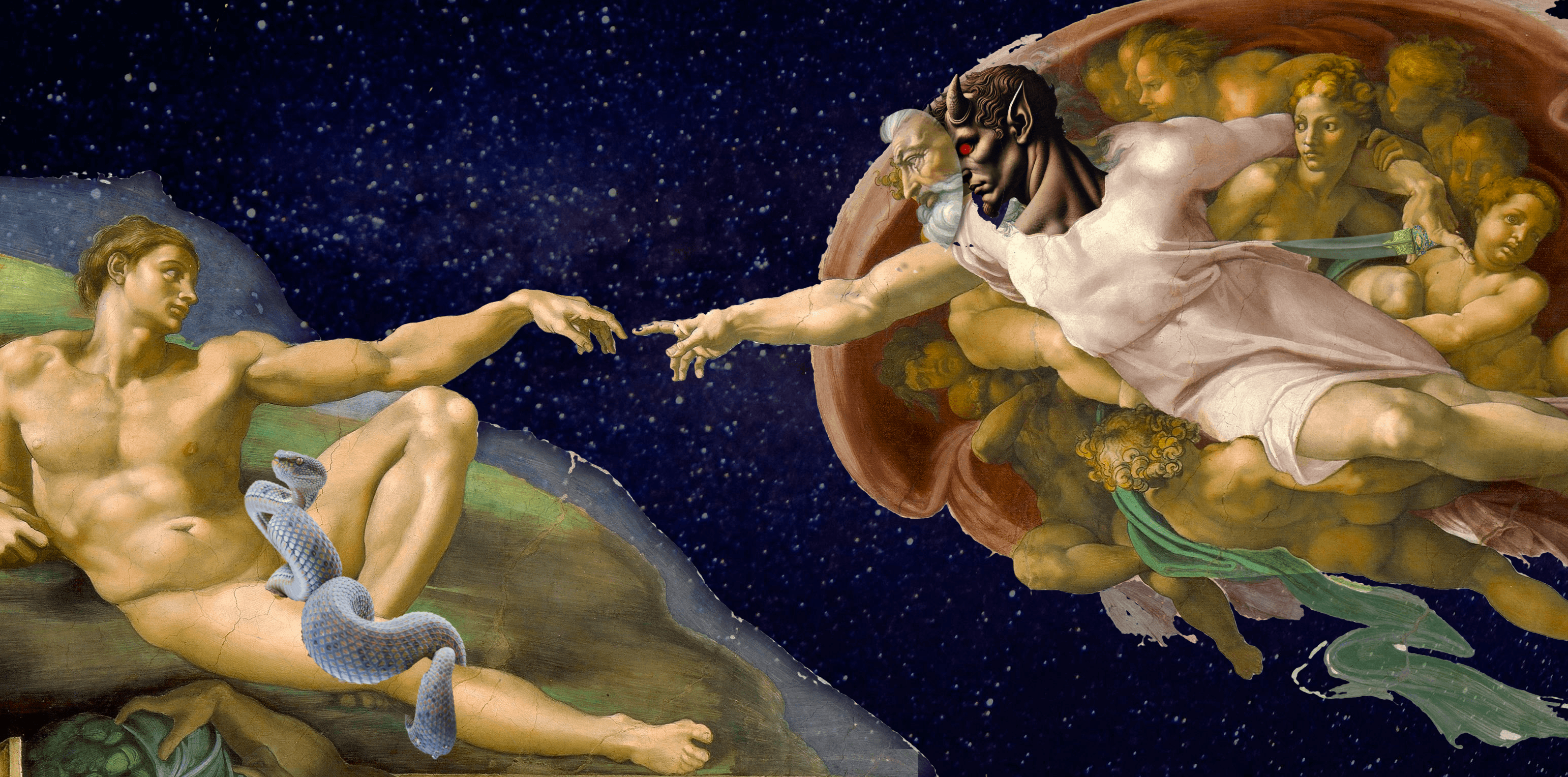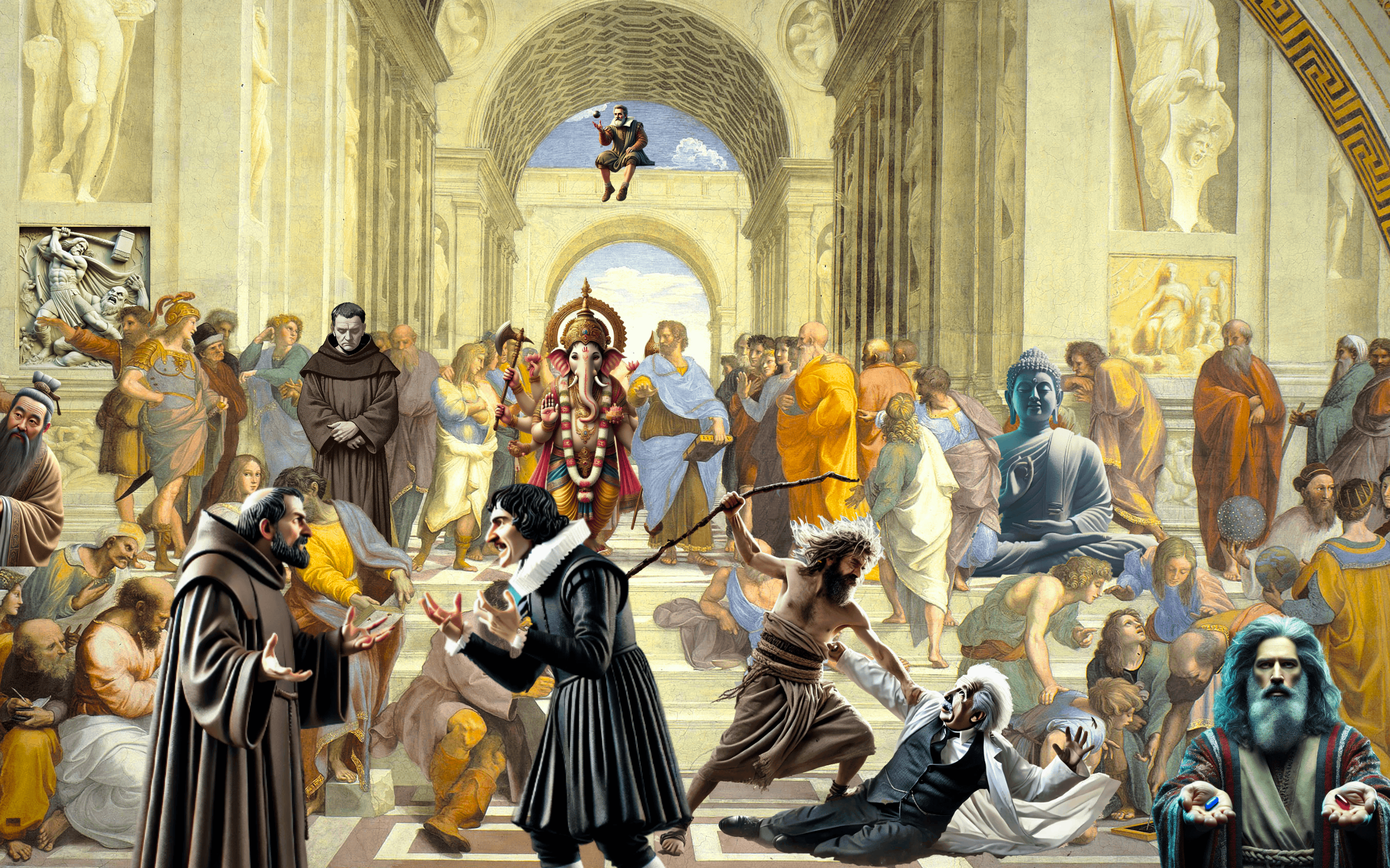
The Real Question to the Answer to Life, the Universe and Everything
Getting past the sex life of demons, the motivations of chickens, and the challenges of disassembling IKEA furniture in the dark, to get to the one question that answers everything.
[This is Part II of my Theory of Everything. It’s not required, but you can read the first part here, in my Introduction to A Theory of Everything. Not a paying Medium Member? Bypass the paywall here.]
What is the answer to life, the universe and everything?
You may recognize the wording, and reflexively answer 42. If so, you’re almost certainly wrong, but at least you know your Douglas Adams¹. And you will also know what his imaginary supercomputer, Deep Thought, pointed out: The answer to life, the universe and everything is meaningless if you don’t know what the question is.
It’s a good point: Knowing the right questions to ask is a great place to start making sense of the Universe.
What, then, is the question to the answer to life, the universe and everything? After thinking about this for more than 30 years, I have finally figured it out.
Unfortunately and unsurprisingly, 42 makes absolutely no sense as the answer. Even more unsurprising: Going through the answer’s full and profound implications for the entire cosmos, and how it allows us to understand everything from morality to myth, from AI alignment to career choices, from consciousness to quantum entaglement, will require more than one post.
So this post is just about the question, not the answer. Bummer, I know. But let’s take baby steps, and get the fundamentals in place, and we’ll get there eventually.
The real question to the answer to life, the universe and everything is …
(drumroll, please)
“What can this possibly mean …?”
(ba-da-kish! i.e. cymbal)
Yes, I know! Even without the fancy drumwork, that sounds like a joke, but I’m only half joking. And if saying that it’s only half a joke also sounds like a joke, I’m only half joking about that, too.
Hear me out…

“Why?”
There are infinitely many answers to “What can this possibly mean …?” — that’s a feature, not a bug — but in a very deep sense and at every level, that question and all its answers is the driving force of the Cosmos.
Now, it’s obviously not about the actual words. The secrets of the Universe aren’t embroidered into the fabric of reality in casual English (or Hebrew, Greek, Arabic, Sanskrit, or astrology for that matter). So, the phrasing is all mine, but I have chosen it for reasons we’ll get into.
Once you get behind the words, however, you’ll discover that the question and its answers reveal something about the universe that runs all the way down.
But first, a little background.
It shouldn’t come as news to anyone that certain questions unlock the secrets of the universe. It has been common sense forever, but most of us haven’t taken in the full implications, or thought too hard about how to pose the right questions.
Back in the day of togas and hallucinogenic wine, one big question they thought might crack open the cosmos and allow us to look inside was “Why?”
“Why did that happen?”
And like attention-hungry five-year-olds, they were never quite satisfied with the first answer they got. There would be follow-up questions.
“… but why does it do that?”
“… and why is it like that?”
It was a very effective little question to ask. Until they broke it.
I blame Aristotle for that. In fairness, he really only articulated beliefs that were quite wide-spread, but I prefer blaming the messenger.
Overthinking chickens and roads
If you asked Aristotle “why did the chicken cross the road?”, he might give you a bunch of different answers:
Because chickens are living, walking, flesh-and-blood beings. And because the road was flat and crossable. And because the chicken was moving. And also to get to the other side.
As Aristotle saw it, there are four different types of causes, or answers to the question “Why?”:
- There’s the material cause, which is what something is made of. Chickens are living, walking, flesh and blood beings. If anything is going to cross a road, a living, walking, flesh and blood being is a really good candidate.
- There’s the formal cause, which is the form it takes. The road was flat, crossable, and in the chicken’s way. If “the road” had been a fifty-foot tower, ten miles away, the chicken probably wouldn’t have crossed it.
- There’s the efficient cause, which is the action taken. The chicken was moving, presumably walking, in a particular direction. Walking is very high up on the list of actions that will cause chickens to cross roads.
- And then, there’s the so-called final cause. To get to the other side. This particular chicken had a purpose, and it was going after it.
I won’t argue with you if you want to make the case that Aristotle was overthinking things a tiny little bit. But overthinking is my jam, so bear with us.
The big problem is with that last cause. The final cause. The idea that things happen in order to fulfill a purpose, can really confuse things.
It’s not a crazy idea. Chickens, like people, can be motivated by some purpose, like finding food. And if you ask a person why they did something, you are asking about their motivations and expectations.²
Aristotle, however, alludes to something more than just human or animal motivation. Again, not entirely crazy. It’s easy to see how someone might think an acorn’s purpose is to fall to the ground and sprout a new tree. Considering that Aristotle didn’t know how acorns evolved, it must have seemed as though the acorn (or whoever made it) “knew” what it some day had to do, and prepared for the task with its purpose in mind.
It’s possible to take this a bit too far, however. If a rock rolls down a hill, it was its purpose to be at the bottom of the hill. It is the fire’s purpose to consume wood, and the water’s purpose to put the fire out.
Aristotle conceded that some things may happen accidentally, without a purpose, but it was too little too late. Besides, not everyone was Aristotle. Most people just thought “everything happens for a reason,” and by “reason” they often meant so that something else that hasn’t yet happened might happen, for some other reason that also hasn’t yet happened.
God’s master plan
The problem is that once we ascribe something a lot like goals to inanimate objects, and once we explain how things in the past were somehow caused by things that haven’t yet happened, it becomes really hard to follow the plot and figure stuff out. The idea of cause and effect gets confused, and the arrow of time is bent out of shape.
You’d be excused if you thought that smart people would catch on to this problem quickly. Except they didn’t. Centuries passed while people accepted fate and destiny, whims of the gods, and some unknown meaning of life, as perfectly valid explanations for why anything happened.
It didn’t help that the Catholic church got really into this line of thinking. They loved the idea that everything happens in accordance with God’s mysterious master plan, and that He has mapped out every step on our journey to the apocalypse.
To this day, people will look at disasters and say “everything happens for a reason” in the sense that God is okay with letting children suffer and die in agonizing pain because he’s making a special omelet and has to break a few eggs. It’s all part of his perverted recipe, in which His ends justify His mysterious ways.
It’s a repulsive idea, yet common among good people. If you dare question it to the wrong people, you’re a heretic. And if you’re a heretic at the wrong time or place, you might burn or get you head chopped off.
Stupid questions
For a while there, giving good answers to good questions fell out of favor, as people got into the habit of torturing, burning, or otherwise ruining the lives of people who wondered whether God was sober, in control, and on track with his grand plan.
People still wanted to understand the world and unlock the universe’s secrets, however, so they didn’t stop asking questions — just good questions. One of the major scientific accomplishments of this era, was to establish definitively that there is, in fact, such thing as a stupid question.
Finding the answer to the big questions of the cosmos, is a bit like trying to disassemble furniture in the dark. We may not know exactly where to start or what we’re doing, but we can tell that we have the right tool when the screws start coming out. In the same way that a Phillips-head screwdriver is near useless on those little Allen screws that IKEA uses, and risks ruining the screws, so some questions don’t get us any closer to the truth, but actually risk making us dumber.
The old caricature of useless questions is “How many angels can dance on the head of a pin?” No one ever posed that particular question seriously, I think, but it is based on all-too-real questions that real thinkers spent time pondering. Like sainted philosopher Thomas Aquinas wondering whether several angels can be in the same physical place at the same time, or the longstanding question (we’re talking centuries of debate) of whether demons feel sexual desire.

Even if there existed a way to purge the question of unfounded assumptions and get definitive answers, those answers wouldn’t get us anywhere we want to go. When it comes to getting to the bottom of the big issues of the universe, they’re precisely as useful as Harry Potter fan fiction. Not all inquisitiveness is equally productive.
And so, it took the better part of two thousand years from Aristotle articulated his final cause, until anyone in the Christian world could say anything out loud and get away with it.
Finally: New rules
Toward the end of the 16th century, literal Renaissance men, like Galileo Galilei and Francis Bacon, proposed some new rules.
As far as science is concerned, they suggested, cause and effect only works in one direction. If a rock has some higher purpose — things to do and places to be — that’s beyond the scope of what we can hope to find out, much less prove scientifically. When we want to explain why, oh why something happens in nature, we should rely on what we can observe, reproduce, and predict.
It’s a good idea. Unfortunately, changing the world is a slow business.
Many people embraced the new rules, which in time became known as the scientific method. But even today, no less than four centuries after Bacon, many people make a living (some make a killing) answering the big “Why?” questions the old-fashioned way: With reference to a higher will and cosmic goals we can only guess at.
“Why?” would be a great question if we could only agree on what it means, and what counts as an answer. But since we obviously can’t agree, I thought I’d put some new words to the question behind the reality of it all.
I don’t expect Gallileo ever used my words, but I’m sure the feeling swirled around his mind, and around all other great minds that have helped humanity throughout the history of ideas: “What can this possibly mean …?”
The screws come loose
So what’s the deal with that question?
Like “Why?”, “What can this possibly mean …?” pokes at causality, and asks us to consider everything that brought us to a specific moment (in the sense “How could this have happened?”). But it also opens the situation up onto the future (in the sense “What might this lead to?”), without assuming any grand plan or purpose.³
There are more reasons why I put the question that particular way, and I’ll get back to some of them in later posts, but the important thing to notice, is how it maps on to the universe: Getting the answers right allows us to predict the future, describe parts of the cosmos we’ve never seen, and create machines that do things our ancestors didn’t think were possible.
This may seem obvious and trivial to you, but if it does, you don’t appreciate how profound this is. When we ask and answer certain kinds of question — and only certain kinds — we get access to the secrets of the cosmos.
When we start with observations of the world around us (rather than with assumptions about supernatural beings) … And when we go looking for mechanisms that make sense of the cause and effect (rather than assume that there’s some inscrutable, invisible hand at work) … And when we apply math and logic to problems (rather than faith) … And when we look closely at this world, and ask “What can this possibly mean?”… Only then do the screws start coming loose.
We can tell the screws are coming loose, because the answers allow us to do things with the universe we couldn’t do before: send people into space and back; save the lives of people with AIDS or brain tumors; travel faster than sound, access virtually all art and knowledge in the world from our pocket, and tell a joke that is instantly heard by millions of people around the world.
This is not about scientism, or some fetishization of the material world. (I promise to disappoint materialists later.) It’s a recognition of the kinds of questions that actually allow us to change life, the universe, and everything.

There is no amount of information about the sex life of demons that will enable you to travel 70 miles per hour while listening to the world’s best musicians. Studying tea leaves won’t tell you how to construct a building that is half a mile tall. Interrogating God’s plan will never allow you to breathe under water or walk on the moon, and accepting “fate” as an answer to “why?” won’t keep your child safe from polio or smallpox.
More than that, however, those ways of asking have never given us any other demonstrable feedback either. Despite millennia of questions about gods, souls and afterlives, fates and oracles, we know about as much about those things today as we did in the stone age, if not less.
The thing that has unlocked all our knowledge, all reasoning, all understanding, is some version of the question “What can this possibly mean?” nagging at the back of some genius’ mind — with this referring to something specific and demonstrable.
Even without the words
There’s a reason that question unlocks the useful answers. It’s not that we’re so great with words, but because the words reflect something about reality itself. Something that was true long before we ever asked the question, and that would have been true even if we had never asked.
The fact that the screws come loose, tells us something about the very shape and nature of reality itself, and about how we can know anything about it. (What philosophers call ontology and epistemology in fancyspeak.) The idea of something like a fundamental truth is out of fashion these days — probably because we’ve become disillusioned by how little such truth we have access to amid all the confusion — but it is so obviously there, just within reach of our curiosity.
In every place and every moment in our universe’s existence, the thing we capture with the question “What can this possibly mean…?” is a bridge from what went before to what comes next — even if there is no one there to ask or answer. Whatever that question gets to, is vowen into the very structure of being.
The question asks itself, and the full answer will always be the truth, the whole truth, and nothing but the truth. What else could it be?
And every answer sets up the question all over again: What can this possibly mean?
That was true billions of years before you and I, Thomas Aquinas and the idea of lustful demons even existed, and it will be true billions of years after we are all gone.
And so the Cosmos goes. That’s how truth, and the cosmos, work … even at the most fundamental level.
Does it ever stop working?
There are people — from brilliant scientists to faithful theists — who think this kind of reasoning can’t give us access to everything. That it doesn’t connect to consciousness, morality, or spirituality. That things like quantum physics, or the origins of life, or the literal beginning of the universe, defy not just our understanding, but even our very ability to understand.
In other words, they seem to suggest that the question “What can this possibly mean…?” will somehow stop working.
They base that on nothing other than assumptions and faith, but as we know, assumptions and faith alone have yet to loosen any screws.
I’m quite confident that my question, wordlessly asked and answered throughout the cosmos — whether in the eyes and mind of a deer pondering the rapidly oncoming headlights, in the implications of two massive galaxies rapidly approaching each other, or in the existence of a single photon emitted into the void — can unlock everything.
That shouldn’t surprise you. Most of us already go through life acting as if we believe everything an explanation, even if we don’t know what it is yet. But it may surprise you to learn how short the way is from there, to a theory that answers all the big questions. Questions like …
- Why is there something rather than nothing?
- What was “before” the beginning?
- What was the first thing and where did it come from?
- Who’s that voice in my head that claims to be me? And if it really is me, then who the hell is it talking to?
- What is the correct answer to the trolley problem?
- Why are electrons and photons so damned weird?
- What even is consciousness, and why? Why is it like something to be you or me or, presumably, a fruit bat?
- Have I lost my marbles? Am I serious?
Hopefully you’re not crazy enough to actually believe me when I say all that, but maybe you’re curious enough to stay tuned — follow or subscribe, perhaps — so you can read more about that and more in future posts.
I should warn you, though: Learning all the answers, seeing how everything fits together, is profoundly anti-climactic. It’s trivial. There’s no choir of angels, no transcendent experience, no bliss or nirvana on the other side of understanding. If that’s what you’re after, you’re in the wrong place.
It doesn’t rob life of meaning and purpose, either. Quite the opposite, really. But it puts the responsibility for having meaning and purpose in your life on yourself.
Because even after you’ve understood everything there is to understand, there’s still one question left to answer — for yourself, for your life, for your future, for your heritage and your legacy:
“What can this possibly mean?”
Footnotes:
1) If you haven’t read Douglas Adams’ The Hitchhiker’s Guide to the Galaxy — possibly the funniest series of books ever written — you should immediately use my affiliate link to buy it, so that you can at least tell people that you own it.
2) People still like to remind each other of that time, more than a hundred years ago, when George Mallory answered such a question with the formal cause, rather than the final. He was asked why he would climb Mt. Everest, and he replied: “Because it’s there.”
3) Those who find the lack of some divine purpose disturbing, should notice that by invoking meaning, the question “what can this possibly mean…?” actually allows us to ascribe some personal, non-material significance to a moment, without assuming a cosmic plan. But I’ll leave the meaning of life to a later post.





